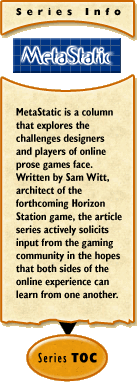 The Digital Ceiling
The Digital Ceiling
by Sam Witt
January 10, 2001
The players of role-playing games have an expectation that, over time, their characters will change and develop. Typically, this is represented by an increase in the characters' abilities, making them stronger, faster, and more capable than they were at start. There is also some expectation that this increase in character ability will go on for quite some time, if not indefinitely.
And that can be a problem. It leads to a hamster-wheel mentality, where players perform repetitive tasks over and over in an effort to 'get a level.' Players caught in the race for the level often find themselves burning out quickly, and not enjoying themselves. They begin to view the game as a job, and start looking for ways to cheat the system to gain more power, more quickly. But they rarely stop to ask themselves what they intend to do with all this power. Their character may have grown to phenomenal proportions in just a few months, but it is a two-dimensional, poorly socialized being with no real life of its own.
Which is not to say that leveling or gaining power is bad, just that it should not become the be-all-end-all of the gaming environment. Players need to be prompted to explore their characters, and enjoy their role in the community, to smell the roses once in a while. Only then can they really have 'fun' within the gaming environment.
I've kicked around a lot of ways to get players off the hamster-wheel, and here are the three that I am most fond of. Feel free to let me know just how wrong I am by using that little button below.
Static Power. In this model, the power and abilities of the characters do not change. They are assumed to enter play at the height of their ability, and will stay there for as long as they continue to be a part of the game. This model has the advantage of keeping everyone roughly equal, and allows everyone to use most of the game's content. The disadvantage is that this model breaks with player expectations and may lead to frustration.
Still, this model has a lot of things going for it. One is the short start-up time. There's no working to get to the point where you start having fun – you start off strong enough to at least attempt most of the game's challenges, and you're able to defend yourself as well as anyone else. And there's always the lure of new and exciting widgets that you can find and use to make your character perhaps a little stronger, giving those achiever-types something to do. Overall, this type of advancement scheme is kindest to those who like to socialize and explore, but will likely not appeal to the gamer who likes a tangible indicator of her advancement.
Limited Growth. Here, characters start off relatively weak, then grow in power to a certain, fairly attainable, point, at which they are assumed to mature and advance no further. While there is a difference in relative ability between the neophyte and the master, the effort to become a master is rather small.
Under this model, characters can start off fairly competent, because the advancement-cycle is relatively short. This gives designers the ability to focus most of their development on the upper end of the power scale, as virtually all characters will reach the 'top.' The downside of this is that players may begin to feel that reaching the pinnacle of character development doesn't mean much, giving way to the same disadvantages seen in the static model, above.
Controlled Advancement. The last method, and by far the one I prefer, does not place an upper limit on the power of characters. Instead, there are hard limits to how fast one can advance, on a per-day basis. The idea is that those players who wish to advance their characters can do so, probably when they first log on to the game, and then they can enter into the more social aspects of the game without feeling like they're 'falling behind the curve.'
This is one of the biggest pressures that players can feel in regards to these games – that if they aren't playing incessantly, they'll somehow fall behind the pack and get left behind. In games with visible progress indicators (like level and experience counters), this is magnified, because you can SEE that your friends are getting ahead of you. A race mentality develops, and the fun stops.
By controlling the per-day advancement of characters, designers can short-circuit this whole cycle. Players know that there is a finite limit to the amount of character-advancement they are able to accomplish with in a given day. If it's done properly, they'll also know that they can get in their quota within a couple of hours. Sure, some people will do their daily advancement, and then drop out of the game for the day. That's all right – they'll still feel like they've gotten their money's worth, and are 'at level' with the rest of the game.
But other players will use the rest of their game time to talk to others, do some exploring, and become involved with the community of the game. And that's the aim – to give players both an outlet for their desire to achieve, and to give them the time to contribute to the community as well.
Whatever advancement scheme that game designers choose to go with, I can't stress enough the importance of forcing players to vary their modes of activity in the game. By only rewarding players for a specific type of activity, especially if doing so results in antisocial behaviors, the designers is forcing the player to engage in 'play' that will quickly become boring, repetitive, and frustrating.
Let's hear your thoughts – click the purty button down yonder and tell me how you really feel. I'm listening.



